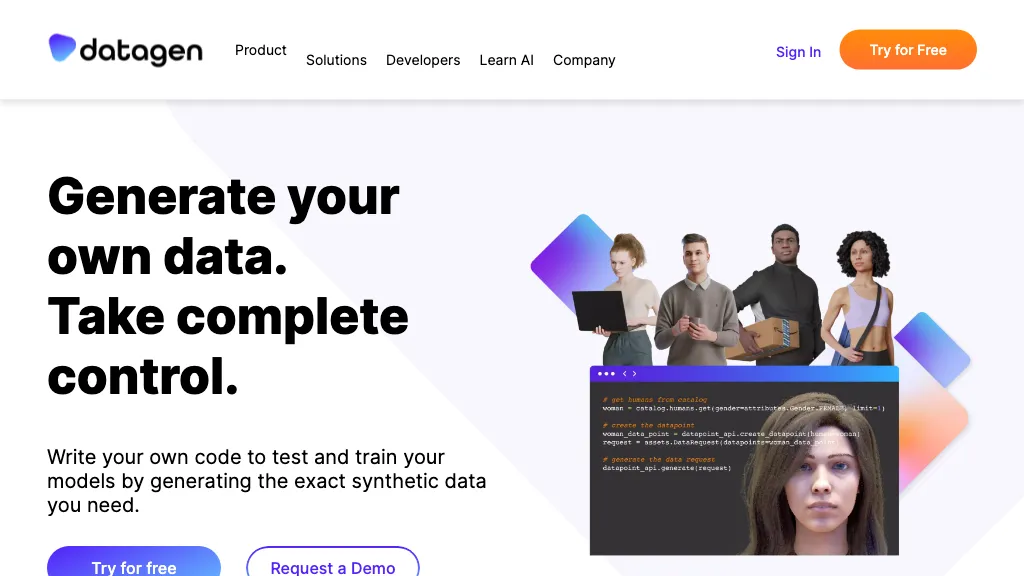What is Datagen?
Datagen is current—devoted to synthetic image and video dataset creation for a huge number of computer vision applications, from face recognition to human body motion recognition. This tool will be useful for companies working in the spheres of automotive, security, fitness, and AR/VR/Metaverse development. Datagen is a sophisticated deep-learning tool that uses many complex algorithms and high-level machine learning techniques to enable the creation of diverse and very realistic datasets in a high customizable level too.
Datagen Key Features & Benefits
Datagen has many features and benefits that place it at the top amidst users, from researchers and developers to AI enthusiasts. Below are some of the key features:
-
Image Generation:
It is capable of designing highly detailed synthetic images with the ability to customize them as per the requirements. -
Video Generation:
Generate realistic synthetic videos for various applications. -
Facial Recognition:
Build and train the facial recognition systems correctly on the synthetic data. -
Human Motion Detection:
Make motion detection algorithms better using the most accurate data. -
API Access:
Connect Datagen with other systems and configurations seamlessly through a strong API.
This platform will not only be user-friendly but also easy to navigate and design with a user-friendly interface so nontechnical people could also find it easy. Secondly, the API will provide a great way for developers to streamline the process and get in and out of existing systems easily.
Datagen can be deployed under a myriad of situations and, further to that, under computer vision project. Below are some examples:
-
Facial Recognition:
One can improve the performance of facial recognition algorithms by training them on synthetic data from various environments. -
Human Motion Detection:
Can be useful for the enhancement of a system for human motion detection/pose estimation in order to get it to work in various environments. -
AR/VR/Metaverse Development:
Develop realistic virtual environments generating synthetic data in the procedure of the augmented and virtual reality application development.
The industries and sectors that become a potential beneficiary of Datagen are automotive, security, fitness, and AR/VR/Metaverse development. The key potential users of Datagen are AI Researchers, Computer Vision Engineers, Machine Learning Engineers, and Data Scientists.
How to Use Datagen
Using the Datagen app is easier because of its user-friendly platform and comprehensive API. Let’s see the process step by step:
-
Sign Up:
Register on the Datagen Platform. -
Define parameters:
Set the parameters that have to be configured. -
Generate data:
Use Datagen to create your dataset. -
Download and use:
Access the built dataset for your projects.
The API documentation describes the steps to implement Datagen into the existing system to make the work less cumbersome.
How Datagen Works
Datagen, on the other hand, utilizes state-of-the-art machine learning technologies along with the use of cutting-edge algorithms to synthesize image and video datasets. Users can define different parameters like resolution, object placement, and the lighting condition to allow a very fine resolution of training and testing AI models on generated datasets. Such a high degree of customization allows for very precise training and testing of AI models.
The usual workflow for generating the dataset includes setting the required parameters, generating the data through the platform or API, and then downloading and using the datasets for your projects. The platform also offers pre-configured environments for camera setup and making ground truth models, which eases the process of data generation.
Advantages
-
Highly Configurable:
Many parameters can be defined, and datasets can be created for specific purposes. -
Realistic Data:
The created datasets are highly realistic and very diverse to reflect realistic real-life situations. -
User-Friendly Interface:
The user-friendly interface ensures that even users who are not that skilled can navigate or design datasets with ease. -
Integration with API:
The application is able to work collaboratively with existing systems through a very strong API.
Weaknesses/Disadvantages
-
Learning Curve:
Even though the interface is user-friendly, there is a learning curve that new users will go through. -
Dependency on Synthetic Data:
Overreliance upon synthetic data may not contain all the nuances of real-world data.
User feedback was mostly positive, emphasizing the ease of use of the platform and quality of the generated datasets.
Conclusion to: Datagen
In simple words, Datagen is an advanced tool in the generation of synthetic datasets that are perhaps highly flexible for high customizability and realistic data. It is user-facing with a very strong API, making it fit for professional technical users. More importantly, if you are doing computer vision or AI research or developing AR/VR applications, Datagen is bound to increase the speed of all your projects.
Instead, the next developments and updates will promise to happen, making the platform’s features one more step closer to perfection and value to the end-users.
Datagen FAQs
-
What industries can benefit from Datagen?
Automotive, security, fitness, AR/VR/Metaverse development, and similar industries are most fitted for Datagen. -
Is Datagen appropriate for users with no technical skills?
Datagen is quite user-friendly, and not very good at technical knowledge is that simple for those who use the tool. -
What is the pricing of Datagen plans?
Datagen uses a freemium model with some basic free features and advanced features at a price. -
Does Datagen Ensure the Quality of Data from Synthetic Datasets?
It features the use of advanced algorithms and machine learning models, which are as diverse, realistic, and high quality as possible.










